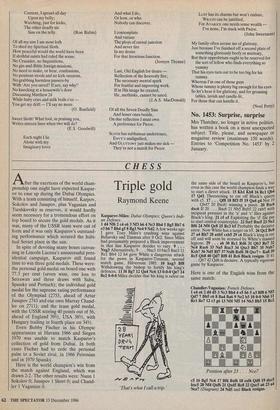CHESS
Triple gold
Raymond Keene
After the exertions of the world cham- pionship one might have expected Kaspar- ov to ease up during the Dubai Olympics. With a team consisting of himself, Karpov, Sokolov and Jusupov, plus Vaganian and Tseshkovsky as reserves, it would hardly seem necessary for a tremendous effort on top board to secure the gold medals. As it was, many of the USSR team were out of form and it was only Kasparov's outstand- ing performance which secured the habi- tual Soviet place in the sun.
In spite of devoting many hours canvas- sing in Lincoln Lucena's unsuccessful pres- idential campaign, Kasparov still found time to win three gold medals. These were: the personal gold medal on board one with 77.3 per cent (seven wins, one loss to Seirawan and three draws with Suba, Spassky and Portisch); the individual gold medal for the supreme rating performance of the Olympiad (2753, ahead of Artur Jusupov 2743 and our own Murray Chand- ler on 2711); and the team gold medal, with the USSR scoring 40 points out of 56, ahead of England 391/2, USA 381/2, with Hungary trailing in fourth place on 341/2.
Even Bobby Fischer in his Olympic appearances at Havana 1966 and Siegen 1970 was unable to match Kasparov's collection of gold from Dubai. In both cases Fischer had to cede the personal palm to a Soviet rival, in 1966 Petrosian and in 1970 Spassky.
Here is the world champion's win from the match against England, which was drawn 2-2. The other results were: Nunn 1 Sokolov 0; Jusupov 1 Short 0; and Chand- ler 1 Vaganian 0. Kasparov-Miles: Dubai Olympics; Queen's Indi- an Defence.
1d4 Nf6 2 c4 e6 3 blf3 136 4 Nc3 Bb4 5 Bg5 Bb7 6 e3 h6 7 Bh4 g5 8 Bg3 Ne4 9 Nd2 A few weeks ago I gave Tony Miles's crushing wins against Beliaysky and Timman after 9 Qc2. Since Miles had presumably prepared a Black improvement in that line Kasparov decides to vary. 9 . . . Nxg3 Alternatively, 9 . . . Nxc3 10 bxc3 Bxc3 11 Rcl Bb4 12 h4 gave White a dangerous attack for the pawn in Kasparov-Timman, second match game, Hilversum 1985. 10 Nxg3 Bf8 Withdrawing the bishop to fortify his king's defences. 11 f4 Bg7 12 Qa4 Nc6 13.0-0-0 Qe7 14 Be2 0-0-0 Miles decides that his king is safest on
'That's what I call a trip.' the same side of the board as Kasparov's, but even in this case the world champion finds a way to start a direct attack. 15 Kbl Kb8 16 Rcl Qb4 17 Qdl Threatening to cut off Black's queen with c5. 17 . . . Qf8 18 Bf3 f5 19 Qa4 g4 Not 19
Qb4? 20 Bxc6! winning a piece. 20 Bxc6 dxc6 If 20 . . . Bxc6 21 Nb5 Bxb5 22 cxb5 with incipient pressure in the 'a' and 'c' files against Black's king. 21 c5 e5 Exploiting the 'd' file pin to start central counterplay. 22 fxe5 BxeS 23 Net Bf6 24 Nf4 Qe8 25 Rc3 b5 Probably the decisive error. Now White has a target on b5. 26 Qc2
27 a4 Rh7 28 axb5 cxb5 29 c6 Black's king is cut off and will soon be stormed by White's massed legions. 29 . . . a6 30 Ra Rd6 31 Qb3 Re7 32 Nc4 Rxc6 33 Nay Rxc3 34 Qxc3 Bb7 35 Nxb7 Kxb7 36 Nd5 Rf7 37 Nxf6 Rxf6 38 Qxc7+ Ka8 39 Rc5 Qb8 40 Qd7 Rf8 41 Rc6 Black resigns If 41 . . . Qb7 42 Qd6 is decisive. A typically vigorous game by Kasparov.
Here is one of the English wins from the same match: Chandler-Vaganian: French Defence. 1 e4 e6 2 d4 d5 3 Nc3 Bb4 4 e5 b6 5 a3 Bf8 6 Nf3 Qd7 7 Bb5 c6 8 Ba4 Ba6 9 Net h5 10 0-0 Nh6 11 Rel Bel 12 c3 g6 13 Nf4 Nf5 14 Nh3 Bb5 15 Bc2 Position after 23 . . . Nce7 c5 16 Bg5 Nc6 17 Bf6 Bxf6 18 exf6 Qd8 19 dxc5 bxc5 20 Nf4 Qxf6 21 QxdS Rc8 22 QxcS a6 23 a4 Nce7 (Diagram) 24 Nd5 and Black resigns.


































































 Previous page
Previous page